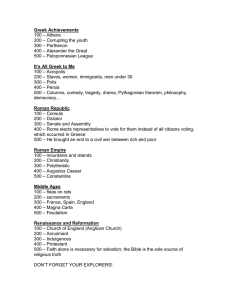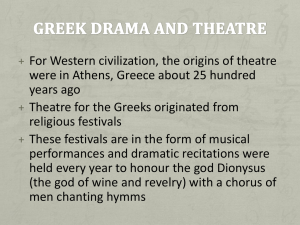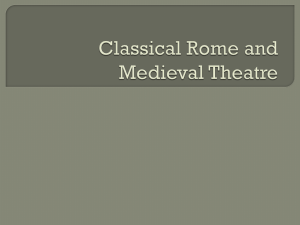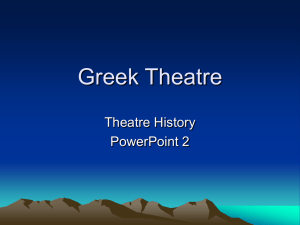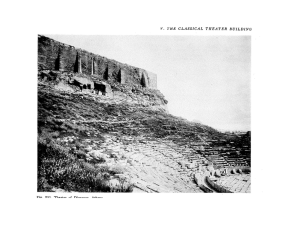TH 106 Research pape..
advertisement
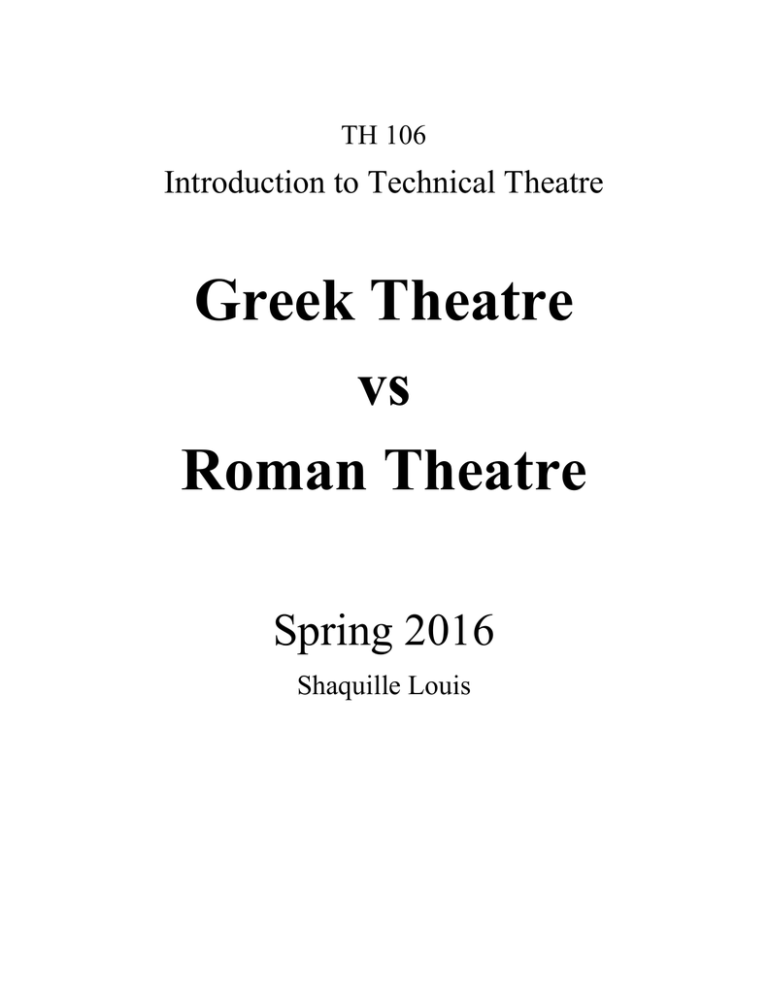
TH 106 Introduction to Technical Theatre Greek Theatre vs Roman Theatre Spring 2016 Shaquille Louis Starting a civilization isn’t exactly an easy task since there are so many aspects such as infrastructure design, form of government, choice of laws to enforce etc. Looking at the periods of which civilizations had risen and fallen the greek empire had begun before the roman counterpart. Given the fact that not only did they exist around an overlapping time period and were close geographically, the roman empire contained certain aspects that were similar to greek culture.1 Greek Pottery was decorated with images that one might interpret as a play. In some cases they were, and in others there were images reflecting poetry recitails, religious ceremonies. Other objects conveyed the same idea as well such as lamps, stone sculptures, paintings and mosicas, and bronze figurines pg 148. Theatre in the more relateable sense consists of plays. Playwrights of Greece wrote tragedies and comedies. Both types of plays were performed in area similar to the one shown below in Figure 1. Originally, plays were performed at one particular event in greek culture, a festival called city Dionysia. The festival occurred only once a year and was held to honor to the greek god Dionysus, the greek god of wine. The types of plays performed were comedies and tragedies. The concept of a tragedy evolved from dithyrambs, which were songs that praised Dionysus.6 The term tragedy itself originates form the two words “tragos” and “ode” which mean “goat song”. The As a result men were often dressed as goats and attempt to dance like them as well. These festivals began around 700 B.C. and as time went on the style of plays slowly changed. Different characters were originally performed by all the same actor, but slowly more and more actors began to be introduced. Since there more characters than actors, masks were highly integrated into performances. When an actor was speaking for a different character, they would change masks. Given that the size of theatre’s were incredibly large, as shown in Figure 1 below, the masks worn were made to be too big for the average face, so those farther away could tell who’s on stage. The masks also were made with special mouth pieces that helped project the actors voice to the back of the theatre.5 In order to help limit the number of actors on the stage, choruses eventually ended up being heavily incorporated into performances.4 The greek preferred tragedies over comedies, so the most of the well known playwrights such as Sophocles, Euripedes, and Aeschylus, were known for their tragedies. One of the more common plays known today that was written by Sophocles is Oedipus Rex. Euripidies is responsible for the success of “Hercules”, and Asechlyus wrote both “The Persians” and “ The Oresteia” trilogy. Retained more greek culture in our modern society In ancient Greece the orchestra was a large round area in front of the stage for the chorus to perform in. The proskenion (from which we get proscenium) was a long sh5 Figure 1. An illustration showing an area used for greek theatrical performances. Greek theatres were called theatrons which consisted of 3 main sections. Looking at figure one, the circle area was known as the orchestra, which was an equivalent to today’s idea of a stage. Behind the orchestra is the skene, which was usually a building of some sort and served its purpose as an area for actors to changes masks and costumes.6 Roman Rome’s first permanent theatre was constructed in 55 BC. The architecture of roman theatre’s contained similar elements when compared to greek theatre, as shown below in Figure 2. Figure 2. . An illustration showing a building used for roman theatrical performances As time progress, around 180 A.D. roman theatre starts to express more independent characteristics, rather than mimicking greek styles.pg 153. Bibliography 1. 2. 3. 4. 5. 6. http://highered.mheducation.com/sites/dl/free/0809222299/45391/WHistory1.html Theatre in ancient greek society- J.R. Green http://www.historyworld.net/wrldhis/PlainTextHistories.asp?ParagraphID=cui http://www.cwu.edu/~robinsos/ppages/resources/Theatre_History/Theahis_2.html http://www.theatre-facts.com/history/ancient-greek-theatre-facts.html http://www.ancientgreece.com/s/Theatre/
